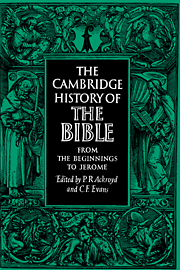Book contents
- Frontmatter
- I LANGUAGE AND SCRIPT
- II BOOKS IN THE ANCIENT WORLD
- III THE OLD TESTAMENT
- IV THE NEW TESTAMENT
- V THE BIBLE IN THE EARLY CHURCH
- 13 BIBLICAL EXEGESIS IN THE EARLY CHURCH
- 14 ORIGEN AS BIBLICAL SCHOLAR
- 15 THEODORE OF MOPSUESTIA AS REPRESENTATIVE OF THE ANTIOCHENE SCHOOL
- 16 JEROME AS BIBLICAL SCHOLAR
- 17 AUGUSTINE AS BIBLICAL SCHOLAR
- 18 THE PLACE OF THE BIBLE IN THE LITURGY
- Bibliography
- Abbreviations
- Notes on the Plates
- Indexes
- Plate Section">
- References
18 - THE PLACE OF THE BIBLE IN THE LITURGY
from V - THE BIBLE IN THE EARLY CHURCH
Published online by Cambridge University Press: 28 March 2008
- Frontmatter
- I LANGUAGE AND SCRIPT
- II BOOKS IN THE ANCIENT WORLD
- III THE OLD TESTAMENT
- IV THE NEW TESTAMENT
- V THE BIBLE IN THE EARLY CHURCH
- 13 BIBLICAL EXEGESIS IN THE EARLY CHURCH
- 14 ORIGEN AS BIBLICAL SCHOLAR
- 15 THEODORE OF MOPSUESTIA AS REPRESENTATIVE OF THE ANTIOCHENE SCHOOL
- 16 JEROME AS BIBLICAL SCHOLAR
- 17 AUGUSTINE AS BIBLICAL SCHOLAR
- 18 THE PLACE OF THE BIBLE IN THE LITURGY
- Bibliography
- Abbreviations
- Notes on the Plates
- Indexes
- Plate Section">
- References
Summary
In his Encyclical Letter Mediator Dei of 20 November 1947 Pope Pius XII wrote, ‘To go back in mind and heart to the sources of the sacred liturgy is wise and praiseworthy. The study of liturgical origins enables us to understand better the significance of festivals and the meaning of liturgical formulas and ceremonies.’ This research is important not only for the question of feast-days, but for the whole structure and content of Christian worship. It is impossible to understand or to appreciate the significance of any of the historical forms if the earliest endeavours to worship God in the Christian faith are ignored. But these endeavours did not arise spontaneously, for they had some connection with the earlier forms in use in Jewish Temple and synagogue. For information on this, the records of the Bible are of primary importance.
There is indeed one apparent complication, that the Bible as such was not in existence in the earliest years of the Christian Church, for the Canon of the New Testament was not settled till about the third century. Nevertheless the documents, both the Old Testament itself, and most of the constituents of the New Testament, were widely known, and are constantly referred to in the Christian literature of the second and third centuries. Apart from anything else, the large amount of surviving homiletical literature witnesses to the interest in and knowledge of the scriptures. It follows that the relation between the Bible and the worship of the early Church must be investigated.
- Type
- Chapter
- Information
- The Cambridge History of the Bible , pp. 563 - 586Publisher: Cambridge University PressPrint publication year: 1970

